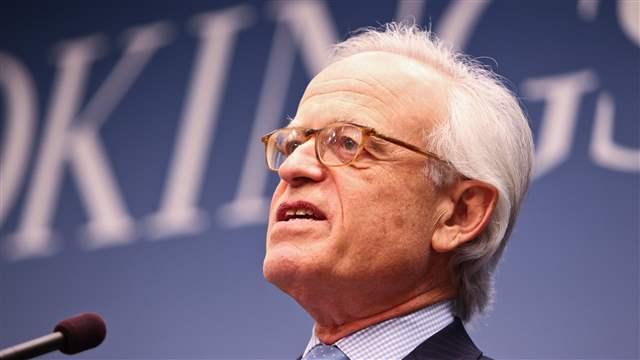

 Washington, D.C.—Martin Indyk, who has been on leave of absence from Brookings while serving as the U.S. Special Envoy for Israeli-Palestinian Negotiations, will return to the Institution as vice president and director of Foreign Policy, Brookings President Strobe Talbott announced today.
Washington, D.C.—Martin Indyk, who has been on leave of absence from Brookings while serving as the U.S. Special Envoy for Israeli-Palestinian Negotiations, will return to the Institution as vice president and director of Foreign Policy, Brookings President Strobe Talbott announced today.
“The entire Brookings community, from our Trustees to our scholars and staff, welcomes Martin back,” said Talbott. “We are extremely proud of his public service and his contributions to the cause of peace as an indefatigable and skilful diplomat. Through his leadership of our Foreign Policy program and his work as a scholar, he will help to ensure that Brookings continues to play its role in helping policy-makers deal with the many challenges facing the world.”
Indyk will assume his duties at Brookings on July 1. Ted Piccone, currently the acting vice president and director of the Foreign Policy Program, will become a full-time senior fellow to continue his work on global democracy and human rights policies; U.S.-Latin American relations, including Cuba; emerging powers; and multilateral affairs.
Prior to his service as special envoy, Indyk had served as vice president and director of the Foreign Policy Program at Brookings since 2009. He was the founding director of the Saban Center for Middle East Policy at Brookings from 2002 to 2009. Prior to joining Brookings, Indyk served as U.S. ambassador to Israel from 1995 to 1997 and from 2000 to 2001. Indyk also served as special assistant to President Clinton and senior director for Near East and South Asian affairs at the National Security Council (1993-1995) and as assistant secretary of state for Near Eastern affairs in the U.S. Department of State (1997-2000).
Indyk is the author of Innocent Abroad: An Intimate Account of American Peace Diplomacy in the Middle East (Simon and Schuster, 2009). Most recently, Indyk co-authored Bending History: Barack Obama’s Foreign Policy with Michael O’Hanlon and Kenneth Lieberthal (Brookings Institution Press, 2012). He holds a bachelor’s degree in economics from Sydney University, and a doctorate in international relations from the Australian National University.

Constanze Stelzenmüller, Fred Dews
May 3, 2024

Ghulam Omar Qargha, Rachel Dyl, Sreehari Ravindranath, Nariman Moustafa, Erika Faz de la Paz
May 3, 2024

Madiha Afzal, Marsin Alshamary, Aslı Aydıntaşbaş, Pavel K. Baev, Sarah A. Binder, E.J. Dionne, Jr., Vanda Felbab-Brown, William A. Galston, Sharan Grewal, Ryan Hass, Tanvi Madan, Suzanne Maloney, Gian Maria Milesi-Ferretti, Itamar Rabinovich, Natan Sachs, Jaganath Sankaran, David Wessel, Andrew Yeo
April 15, 2024